Leading change
Unisa—finding solutions to problems

To find a solution to this problem, CSET approached the Energy and Water Sector Education and Training Authority (EWSETA) for assistance. The EWSETA agreed to assist and have provided financial assistance worth R3 million. This amount will sponsor more than 100 students towards their WIL training, which will enable them to obtain their Unisa qualification.
This initiative means a great deal for CSET and its students. The funding will be of significance to the future of many students, as it will enable those who were delayed in their studies to graduate and to start supporting their families once they obtain their qualifications.
This will inevitably increase the CSET throughput rate. The bursary programme shows that the college really cares for its students and acknowledges their welfare. CSET cannot sit down and allow poverty to get in the way of students attaining their qualifications.
As Unisa, we cannot afford to work in a vacuum; we need strategic partnerships, and, according to Professor Bhekie Mamba, CSET Executive Dean, strategic partnerships do not come in any form better than that of working with the SETAs. We are not only celebrating this particular grant but also celebrating the fact that the university is pushing its agenda of transformation and speaking to the needs of the community
In conclusion, the Executive Dean mentioned that this is just the beginning. CSET is embarking on a number of new initiatives to ensure that the Science Campus and its state-of-the-art laboratories and its researchers are widely exposed.
According to Mamba, it is important to cultivate a sustainable Science Campus that will generate a third-income stream. Sustainability also comes in many forms, such as maintaining a high pass rate, a high throughput rate, and a high graduation rate. According to Mamba, if the university can get that right, then in no time the Science Campus situated in Florida will be known in many people’s minds, not only in the country, but also worldwide.
*By Thembeka Ntuli-Mpapama
Publish date: 2018/05/04